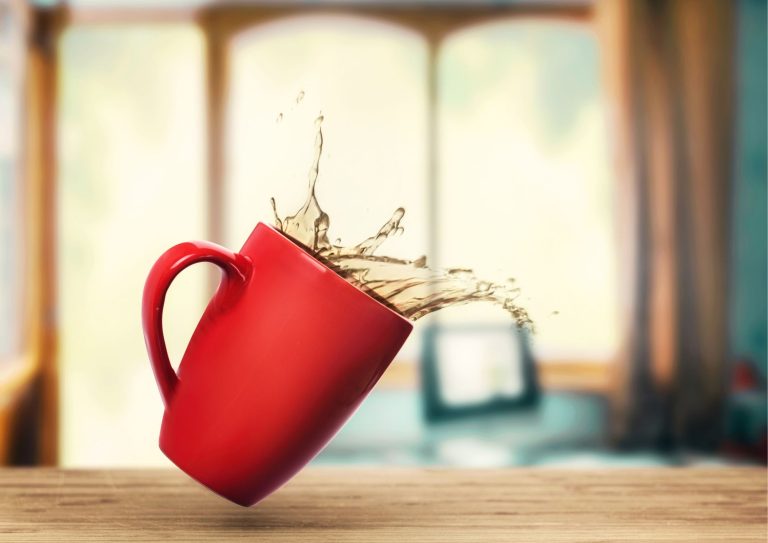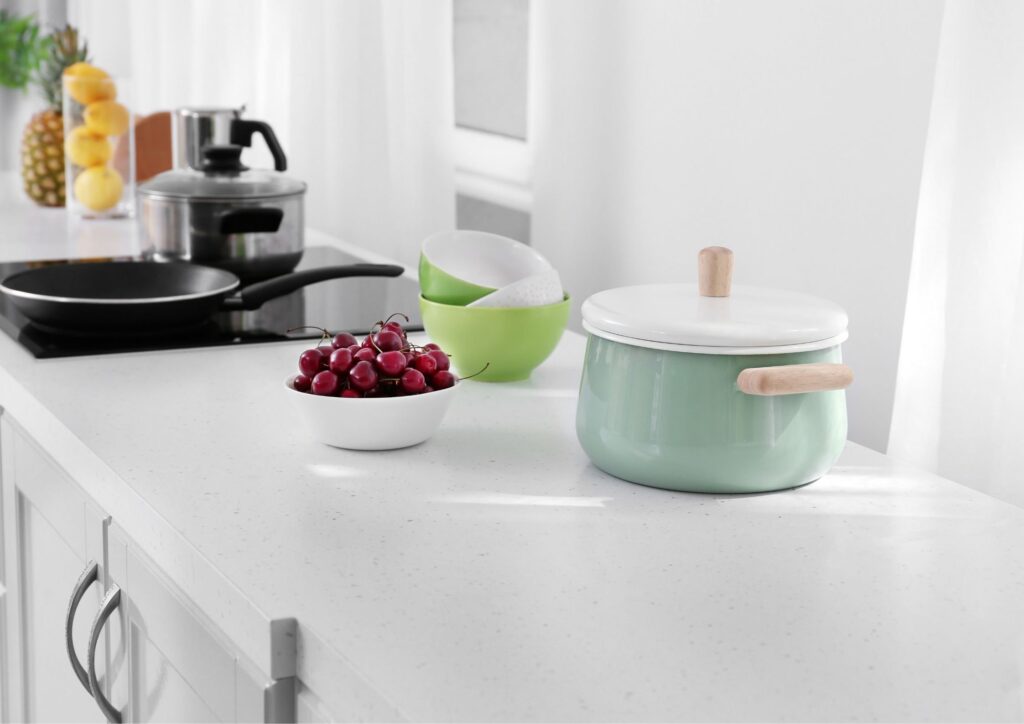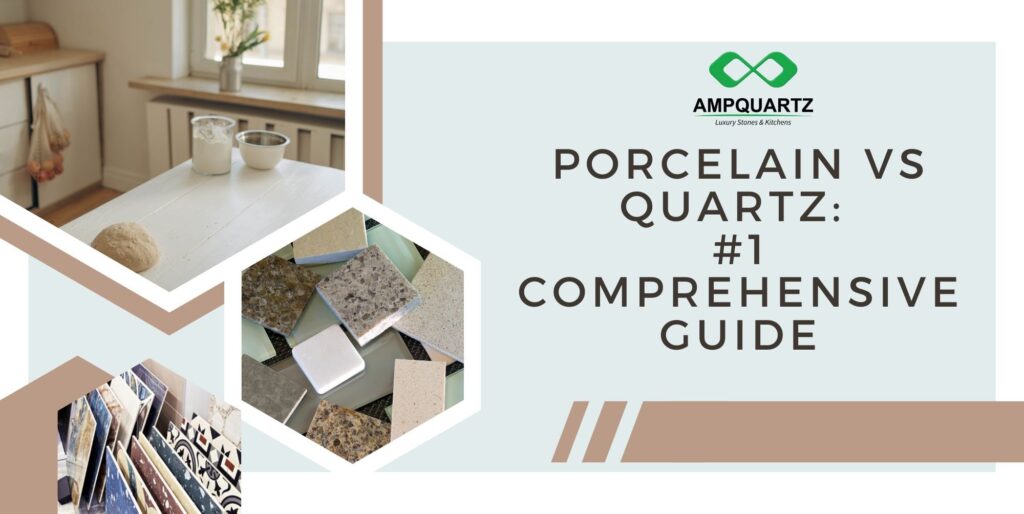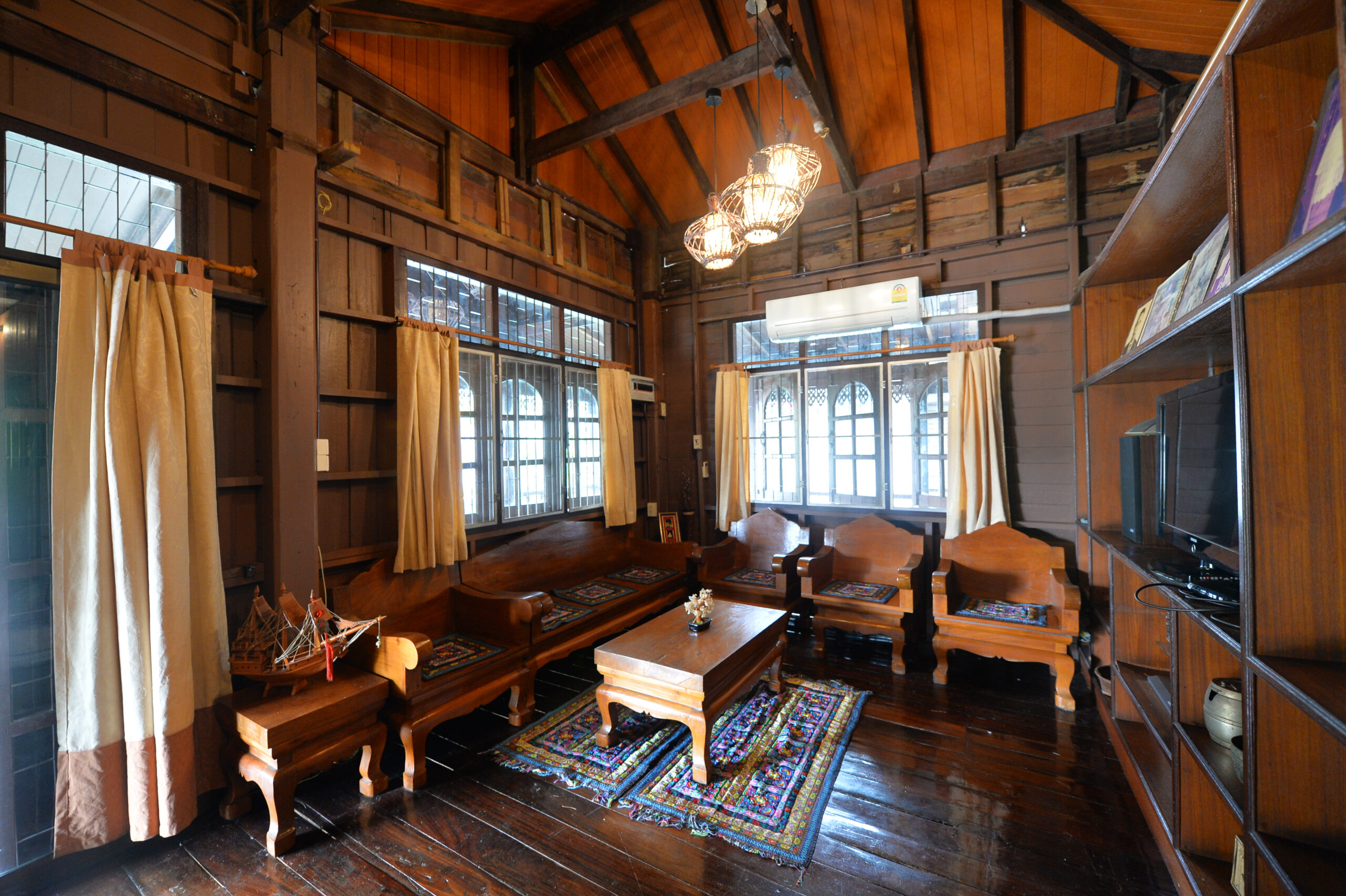Modern Kitchens: Porcelain vs. Quartz Countertops for Seamless Style and Durability
In today's open-concept homes, kitchens are no longer isolated rooms. They're fluid spaces that blend seamlessly with living areas, making them a central hub for daily life. Since kitchens are high-traffic zones, choosing the right countertop material is crucial.
Two popular and trendy options are porcelain and quartz. But with so many choices available, it can be overwhelming to pick the perfect one. Today's homeowners prioritize durability, design aesthetics, and how the material enhances their home's value.
If you're passionate about cooking, your kitchen deserves a countertop that can handle the heat (literally!). While there are many materials to consider, let's explore the pros and cons of porcelain and quartz to help you find the perfect fit for your dream kitchen.
What Are Porcelain And Quartz?

Image Credit: Canva
Understanding the Materials: Porcelain vs. Quartz Countertops
Before we delve into their pros and cons, let's break down the key differences between porcelain and quartz countertops.
Porcelain:
- A natural material made from kaolinite clay (for plasticity) and petunse (for translucency and hardness).
- Formed by heating these materials at high temperatures in a kiln.
- Offers a smooth, non-porous surface that resists scratches and stains.
Quartz:
- A man-made material engineered from pulverized natural quartz crystals (for strength and beauty).
- Blended with resin binders and pigments to create a durable and versatile surface.
- Often incorporates recycled materials like glass or mirrors, adding a touch of sustainability.
Porcelain VS Quartz #1: Ease of cleaning

Image Credit: Canva
Understanding Quartz & Porcelain Quality
Quartz:
Resin & Pigments: Quartz countertops are composed of crushed quartz crystals bound together with resins and pigments. While these offer a wide variety of colors and design options, the amount used can affect quality. Higher resin content means less quartz, resulting in a less durable countertop that might be more prone to chipping or cracking.
Quality Variations: The quality of quartz countertops can vary depending on the manufacturer. Look for reputable brands that use a high percentage of quartz for optimal durability.
Porcelain:
- Natural Strength: Unlike quartz, porcelain countertops are entirely natural, made from fired clays and minerals.
- High-Temperature Firing: Porcelain undergoes a high-temperature firing process that results in a very dense, non-porous material. This translates to exceptional technical characteristics, including:
- Abrasion resistance: withstands scratches and wear-and-tear.
- Thermal shock resistance: handles hot pots and pans without cracking.
- Chemical resistance: resists stains and harsh cleaning products.
Choosing the Right Material:
By understanding how resin content affects quartz and the inherent strength of porcelain, you can make an informed decision about which material best suits your needs and desired level of durability.
Porcelain VS Quartz #2 – Visual Appearance

Image Credit: Canva
Unveiling the Beauty: Appearance of Porcelain vs. Quartz Countertops
Both porcelain and quartz offer stunning aesthetics, but their visual appeal comes from different sources:
Porcelain:
- Naturally occurring minerals like silica and feldspar contribute to porcelain's inherent color variations.
- Porcelain countertops often come in solid, uniform colors, offering a sleek and contemporary look. Popular choices include black, white, gray, and brown, but some manufacturers may offer additional colors.
Quartz:
- A man-made material, quartz countertops derive their visual interest from the incorporated quartz chips and pigments.
- Unlike porcelain, quartz often features a speckled or mottled appearance, with tiny flecks of the quartz mineral visible throughout the resin binder. This creates a more natural, textured look.
Choosing Your Ideal Aesthetic:
Do you prefer the clean lines and solid colors of porcelain, or are you drawn to the natural variations and textures of quartz? Considering your kitchen's overall design and personal taste will help you choose the countertop material that best complements your vision.
Porcelain VS Quartz #3: Porosity and Liquids

Stain Resistance Showdown: Porcelain vs. Quartz Countertops
When choosing kitchen countertops, a crucial factor is how well they resist stains and spills. Here's how porcelain and quartz compare:
Porcelain: A champion of stain resistance, porcelain boasts an extremely low absorption rate (less than 0.5%). This means liquids bead up on the surface, minimizing the risk of staining. This makes porcelain a popular choice for both home kitchens and high-traffic areas like restaurants and hotels.
Quartz: While generally stain-resistant, quartz can be slightly more susceptible to staining compared to porcelain, especially if it has a high resin content. However, most high-quality quartz countertops still offer excellent resistance to everyday spills and can be easily cleaned with mild soap and water.
Porcelain VS Quartz #4: Aesthetic variety

Image Credit: Canva
Porcelain: A Canvas for Your Kitchen Dreams
Porcelain reigns supreme in design versatility. It offers a vast array of finishes, textures, and patterns, allowing you to replicate the look of luxurious marble, warm wood grains, natural stone beauty, or even modern concrete – all while maintaining outstanding performance.
Imagine crafting a kitchen that reflects your unique personality. With porcelain, you're not limited to a few color options. Unleash your creativity and explore an “infinite choice” of material inspirations to create a truly customized masterpiece.
Beyond Beauty: Enhanced Performance with Porcelain
Some porcelain countertops undergo special surface treatments, adding a touch of elegance and simplifying cleaning. This ensures your stunning countertop maintains its flawless look for years to come.
Quartz: Beauty in Simplicity
While quartz offers a decent selection of colors, its design flexibility falls short compared to porcelain. Quartz countertops typically come in three standard thicknesses (6mm, 12mm, and 20mm) and a more limited range of finishes and textures.
Porcelain VS Quartz #5: Unalterability Over Time

Image Credit: Canva
Kitchen countertops need to be tough enough to handle the heat of everyday cooking. Let's see how porcelain and quartz fare in this fiery battle:
Porcelain: The Heat Champion
For passionate cooks, porcelain countertops are a dream come true. This super-durable material is completely unfazed by hot pots and pans. You can place scorching cookware directly on the surface without worrying about discoloration or warping. Porcelain's exceptional heat resistance ensures your countertop maintains its flawless appearance for years to come.
Quartz: Mind Your Heat
While quartz offers good durability, it's not as heat-resistant as porcelain. Extreme heat can cause discoloration, especially in darker colors or those with high resin content. It's always best to use trivets or heat pads with hot cookware to protect your quartz countertop.
Long-lasting Beauty
Both porcelain and quartz are known for their lasting beauty. Porcelain's color remains consistent over time, resistant to fading, darkening, or lightening. High-quality quartz countertops also offer good color stability, although lighter colors might be a safer choice for those concerned about heat exposure.
Choosing the Right Material
For those who prioritize heat resistance and unwavering aesthetics, porcelain countertops are the clear winner. If you're a careful cook or prefer a wider range of color options, quartz can still be a great choice, but be mindful of using hot cookware directly on the surface.
Porcelain VS Quartz #6 – Installation

Image Credit: Canva
Installation Considerations: Porcelain vs. Quartz Countertops
While both porcelain and quartz offer beautiful and durable countertop options, their installation processes differ:
Porcelain:
- Thinner and Lighter: Porcelain countertops are thinner and lighter than quartz. This can be a significant advantage if you're considering installing them over your existing countertops. In some cases, it might eliminate the need for complete removal, saving on time and demolition costs.
Quartz:
- Bulkier and Heavier: Quartz countertops are heavier and bulkier due to their material composition. Installing them typically requires placing them directly on top of your cabinets. In some instances, additional cabinet reinforcement might be necessary to ensure proper support for the weight of the quartz slabs.
Demolition Considerations:
Before installation, assess your existing countertops and cabinets. If your current countertops are in good condition and structurally sound, porcelain might be a good option as it allows for potential installation directly on top. For quartz, plan on removing your existing countertops and potentially reinforcing your cabinets to accommodate the weight.
Choosing the Right Material for Installation
Consider your budget, timeline, and the condition of your existing countertops when making your decision. If minimizing demolition and saving time are priorities, porcelain's lighter weight and potential for overlay installation might be advantageous.
Porcelain Vs. Quartz – Which One To Choose?

Image Credit: Canva
Porcelain vs. Quartz Countertops: Choosing the Right Material for Your Kitchen
While both porcelain and quartz are popular choices for kitchen countertops, they have distinct advantages and disadvantages. Let's explore these factors to help you make an informed decision.
Versatility:
Porcelain: Porcelain tiles offer wider application beyond countertops. They can be used for walls, backsplashes, and even outdoor flooring due to their superior weather resistance.
Quartz: Quartz is primarily designed for countertops and indoor applications. While durable, it might not withstand harsh outdoor elements.
Heat Resistance:
Porcelain: Porcelain excels in heat resistance. You can place hot pots and pans directly on the surface without worrying about discoloration. This makes it ideal for busy kitchens.
Quartz: While generally durable, quartz can be susceptible to heat damage, especially dark colors or those with high resin content. It's recommended to use hot pads or trivets with quartz countertops.
Durability:
Porcelain: Porcelain is a very hard and scratch-resistant material. However, due to its thinner profile, it might be more prone to chipping on the edges if struck with significant force.
Quartz: Quartz countertops are known for their exceptional overall durability, including scratch and chip resistance. Their thicker profile also contributes to a more substantial feel.
Choosing the Perfect Surface Between Porcelain and Quartz
The Countertop Showdown: Porcelain vs. Quartz
Choosing the perfect countertop material for your modern kitchen can be overwhelming. Both porcelain and quartz offer stunning aesthetics and impressive durability, but they cater to different needs. Let's delve into their key features to help you make an informed decision.
Porcelain: The Natural Beauty
Technical Powerhouse: Porcelain boasts exceptional technical characteristics. Fired at high temperatures, it becomes exceptionally resistant to scratches, heat fluctuations, and even harsh chemicals.
Design Versatility: Porcelain comes in a wide range of colors and finishes, allowing you to create a truly customized look for your kitchen. With its low porosity, it also resists staining for easy maintenance.
Heat Champion: For passionate cooks, porcelain is a dream come true. Hot pots and pans can be placed directly on the surface without any risk of discoloration.
Quartz: The Man-made Marvel
Engineered Durability: Quartz countertops are crafted from crushed quartz crystals bound with resin. This combination offers exceptional overall durability, resisting scratches, chips, and everyday wear-and-tear.
Speckled Appeal: Quartz typically features a distinctive speckled appearance due to the visible quartz chips. This creates a unique aesthetic that complements various kitchen styles.
Consider Heat: While generally durable, quartz can be susceptible to heat damage, especially dark colors or those with high resin content. Using hot pads or trivets is recommended.
Choosing Your Ideal Countertop
The best material for you depends on your priorities:
Heat Resistance & Unwavering Beauty: If you prioritize heat resistance and maintaining a flawless look, porcelain reigns supreme.
Durability & Wider Color Options: If overall durability, a wider variety of colors, and a chip-resistant surface are more important, quartz might be a better fit.





